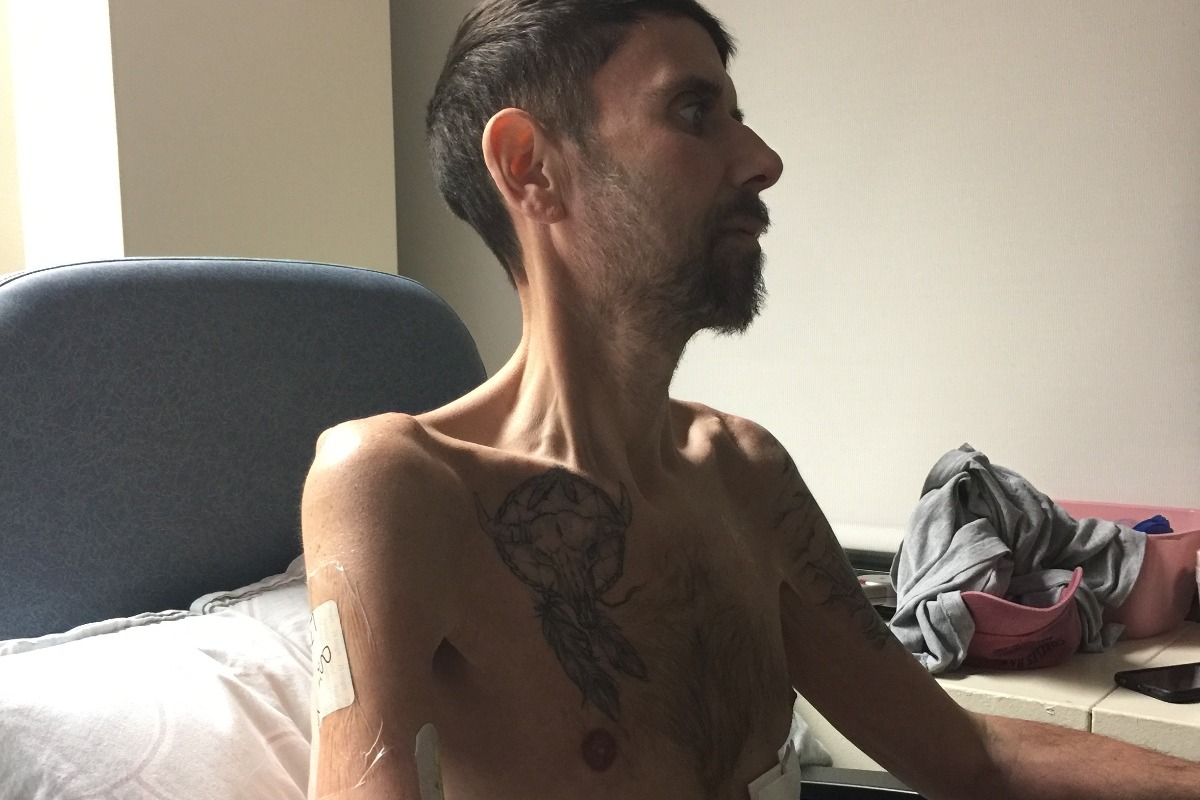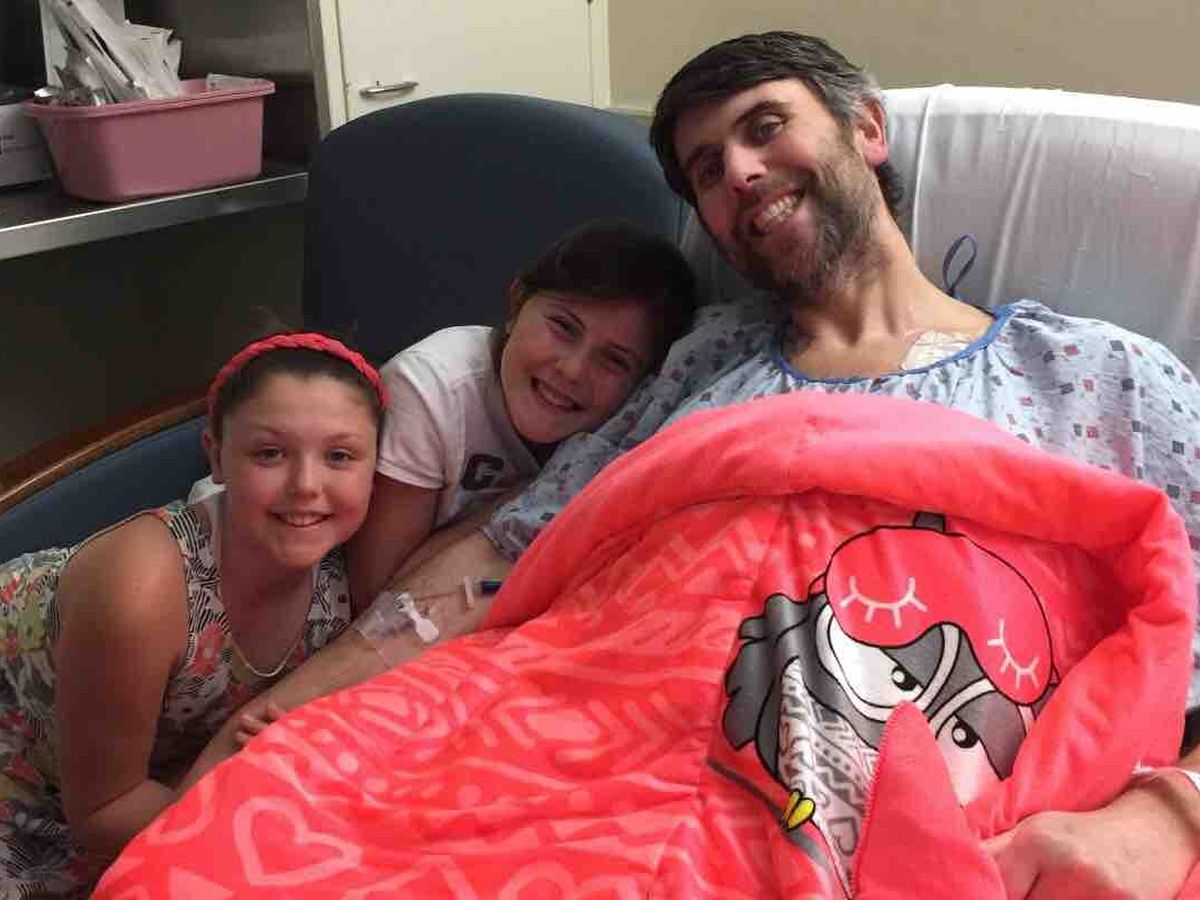Back in June of 2016, little did Matt know that life as he knew it would change forever. Now, Matt needs an Intestinal Transplant.
Matt has been diagnosed with a condition called myopathic pseudo-obstruction . This means that the smooth muscles that move food along in his digestive tract, have stopped working. As a result, he can no longer eat and has daily episodes of extreme vomiting. Since he cannot eat, he needs to be fed intravenously with TPN (Total Parental Nutrition) . Each night he is hooked up to his TPN and it runs over the course of 12 hours, in order for him to live.
While TPN is a lifesaver, it comes with some serious long term complications. TPN is extremely hard on the liver and many people that are on TPN for an extended amount of time will go into liver failure. In addition, line infections are quite common (Matt has already had two) and can lead to sepsis. Other health issues associated with long term TPN are developing osteoporosis, cholecystitis and vitamin and mineral deficiencies.
The only “cure” for myopathic pseudo-obstruction, is an intestinal transplant. An intestinal transplant is the most complex and rare of all the organ transplants. To give you an idea, last year there were only 109 intestinal transplants compared to 19,850 kidney transplants in the United States. Due to it rarity and complexity, it is also the most expensive single medical procedure in the U.S., costing a whopping $1.2 million dollars.
While Matt has health insurance that will cover the bulk of the medical expenses, there are many additional financial aspects of care and recovery, which are not covered by insurance. He will spend the first five days in the ICU and is expected to be in the hospital anywhere from 4 to 6 weeks. During this time his wife will need to take unpaid time off from work, especially in the very beginning. Dana will be able to stay at a “transplant house” for the first few days after his surgery that is just blocks from hospital, but it is not free. Once Matt is stable and moved from the ICU, Dana will return home to get back to work and be there for their two girls, Madison and Alexis.
During the remainder of his hospital stay Dana and their daughters will commute into the city as often as possible to visit Matt. Whether it’s by car or mass transit, the costs of going into the city will quickly add up. Once Matt is finally discharged, he will be coming home on approximately 20 medications, which will cost around $1250 - $1,500 a month out of pocket. He may also need in home nursing care, which is only partially covered by insurance. Matt will also need to make weekly trips back into the city to ensure he is progressing and not having an issues with rejection or graft vs. host disease. With intestinal transplants, there can be many ups and downs over the course of the first year and additional hospital stays are not uncommon. In addition to the upcoming expenses, his existing medical bills are just under $8,000.

Thank you for considering donating, it's greatly appreciated! It doesn't matter how big or small the donation is, everything helps!
Matt has been diagnosed with a condition called myopathic pseudo-obstruction . This means that the smooth muscles that move food along in his digestive tract, have stopped working. As a result, he can no longer eat and has daily episodes of extreme vomiting. Since he cannot eat, he needs to be fed intravenously with TPN (Total Parental Nutrition) . Each night he is hooked up to his TPN and it runs over the course of 12 hours, in order for him to live.
While TPN is a lifesaver, it comes with some serious long term complications. TPN is extremely hard on the liver and many people that are on TPN for an extended amount of time will go into liver failure. In addition, line infections are quite common (Matt has already had two) and can lead to sepsis. Other health issues associated with long term TPN are developing osteoporosis, cholecystitis and vitamin and mineral deficiencies.
The only “cure” for myopathic pseudo-obstruction, is an intestinal transplant. An intestinal transplant is the most complex and rare of all the organ transplants. To give you an idea, last year there were only 109 intestinal transplants compared to 19,850 kidney transplants in the United States. Due to it rarity and complexity, it is also the most expensive single medical procedure in the U.S., costing a whopping $1.2 million dollars.
While Matt has health insurance that will cover the bulk of the medical expenses, there are many additional financial aspects of care and recovery, which are not covered by insurance. He will spend the first five days in the ICU and is expected to be in the hospital anywhere from 4 to 6 weeks. During this time his wife will need to take unpaid time off from work, especially in the very beginning. Dana will be able to stay at a “transplant house” for the first few days after his surgery that is just blocks from hospital, but it is not free. Once Matt is stable and moved from the ICU, Dana will return home to get back to work and be there for their two girls, Madison and Alexis.
During the remainder of his hospital stay Dana and their daughters will commute into the city as often as possible to visit Matt. Whether it’s by car or mass transit, the costs of going into the city will quickly add up. Once Matt is finally discharged, he will be coming home on approximately 20 medications, which will cost around $1250 - $1,500 a month out of pocket. He may also need in home nursing care, which is only partially covered by insurance. Matt will also need to make weekly trips back into the city to ensure he is progressing and not having an issues with rejection or graft vs. host disease. With intestinal transplants, there can be many ups and downs over the course of the first year and additional hospital stays are not uncommon. In addition to the upcoming expenses, his existing medical bills are just under $8,000.

Thank you for considering donating, it's greatly appreciated! It doesn't matter how big or small the donation is, everything helps!
Organizer and beneficiary
Dana Cremen
Beneficiary

